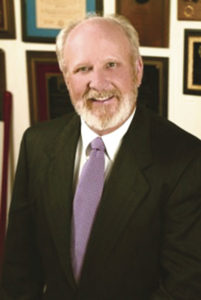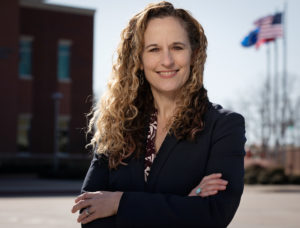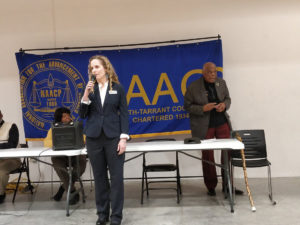Before the tumultuous year that has been 2020, county commissioner meetings drew minimal public attention. Held at the county administration building downtown, the four commissioners and Judge Glenn Whitley were tasked every Tuesday morning with governing Texas’ third-most populous county. The days of orderly and predictable meetings are long gone.
Earlier this year, the commissioners fielded a several-hours-long heated debate over the county’s controversial agreement with Immigration and Customs Enforcement (ICE) known as 287(g). Following a 3-2 vote, that agreement, which allows Tarrant County sheriffs to be deputized by ICE agents for limited immigration-related enforcement actions, was renewed with the caveat that the commissioners will review the agreement annually.
The pandemic subsequently brought vehement anti-maskers who voiced their concerns over public health mandates — presumably while not wearing face masks — during county meetings. Affluent white families even joined in by protesting at the administration building in July when the parents learned that classrooms in the wealthy Tanglewood neighborhood would not be opened due to public health concerns.
Finding consensus when swaths of Tarrant County residents are emotionally on edge is no easy task, but four candidates are vying for two open commissioner court seats. A slew of county-elected positions are up for grabs on Nov. 3 in addition to the seats for Commissioner Precincts 1 and 3.
Longtime commissioner Roy Brooks, a Democrat, has held the Precinct 1 seat since 2005. Brooks is running against Republican Roy Lozano, an accountant who failed to unseat Brooks four years ago.

Photo courtesy of Tarrant County.
Republican Gary Fickes, who is seeking re-election, has served as Precinct 3 commissioner since 2005. Democrat Kathy Braatz, an Army veteran, longtime professional engineer, and political newcomer, is seeking to tilt the court away from Tarrant County’s conservative status quo. We sent both Precinct 3 candidates the same questions several weeks ago. Fickes did not respond to numerous requests for responses.
What qualities and experience do you bring to this office?
Braatz: I am an Army veteran, former military police officer, and have been a leader of many local political and civic organizations. I am not a career politician. I’ve been a quality engineer for over 24 years, which involves taking a proactive approach and implementing measures before problems occur. I’ve been an activist, supporting and organizing for like-minded candidates in my community, for the past several years. I have unique perspective and experience that is well-suited for serving my community that I deeply care about.
Fickes: No response.

Photo courtesy of Kathy Braatz.
Describe your experience living in or working in Precinct 3. What sets this part of Tarrant County apart?
Braatz: I’ve lived in Precinct 3 since 2010 but work outside of the precinct. Precinct 3 is very diverse socioeconomically and demographically, and there are so many great features of the precinct, from easy access to DFW Airport to the quaintness of Main Street in Grapevine.
Fickes: No response.
What issues are most pressing to Precinct 3 residents? How do you plan to address these issues as county commissioner?
Braatz: The Commissioners Court has enormous influence over policies that affect the lives of Tarrant County residents, especially in the areas of public health, elections, criminal justice, economic well-being of residents, and well-paying jobs. I have a unique perspective and will bring problem-solving experience and a fresh voice to the court.
The biggest issue that is affecting our community right now is the COVID-19 crisis, and we need the strongest possible responses to tackle the biggest public health crisis of our lifetime. As the deep economic impact of COVID-19 takes root, we need to make health care more accessible to those who need it and provide access to mental health care. The county jail shouldn’t be the largest mental health care provider in the county.
In the short term, making elections safe, accessible, and fair to every citizen in this pandemic environment is critical. In the long run, equal access to voting is so important. That means increasing polling locations and hours and expanding early voting for everyone.
Another key issue is reforming the criminal justice system to make it fair and equitable to minorities and economically disadvantaged.
Fickes: No response.

Photo courtesy of Kathy Braatz.
Do you support the county’s 287(g) agreement with ICE?
Braatz: When I am on the court, I will vote to repeal 287(g). Immigration is under federal, not county, jurisdiction. 287(g) promotes racial profiling and spreads fear among the immigrant community. Residents should feel safe in reporting crimes, not fear that they will be deported.
Fickes: No response.
What are your views on the Black Lives Matter movement? Do you support the local protests that are part of that national movement?
Braatz: Residents of the county have the right to lead a dignified life and should be treated with respect and care. We need to work towards reducing institutional bias and creating safe communities by investing in and properly funding schools [while supporting] higher home ownership, good-paying jobs, small businesses, and affordable health care. Movements like BLM highlight the persistent inequalities and injustices that are widespread in our community.
Fickes: No response.
Tarrant County received $220 million in coronavirus relief funds from the U.S. Treasury. Are those funds reaching those who need them most?
Braatz: One of the key deficiencies of the law is weak oversight and lack of transparency on how the relief money is being spent. When I get on the court, I will push for transparency and strong oversight of the funds. I believe that the money needs to be spent on immediate needs of the community as we fight through this pandemic.
Fickes: No response.
Tarrant County took steps in recent years to improve its magistration process. Dallas and Harris counties have been targeted by costly lawsuits that find monetary bail to be unconstitutional. Have Tarrant County’s reforms gone far enough?
Braatz: Criminal justice and bail reform are my other key priorities. I believe no one should stay in jail for minor offenses just because they cannot pay.
Fickes: No response.

Photo courtesy of Kathy Braatz.
The county recently approved merit-based pay increases for employees for next fiscal year. Given that so many businesses and constituents have been impacted by COVID and are currently unemployed, do you think this is a prudent use of county funds?
Braatz: For the county employees who risked their lives and worked incredibly hard to deliver services to the residents of the county, I value their commitment and work ethic. However, it does not give a good impression to give raises during this time, given the economic impacts throughout Tarrant County. It would be prudent to hold off this year on raises and use those funds to help unemployed residents — especially in the areas of evictions and childcare.
Fickes: No response.
There has been increasing opposition to mask mandates at commissioners court meetings. What is your stance on mask mandates?
Braatz: The mask mandates are in the interest of public health and safety. As the data shows, wearing a mask is a simple, effective way to slow the spread of COVID-19.
Fickes: No response.
What are your thoughts on the county’s current level of debt and departmental spending?
Braatz: When I am the county commissioner, I will take a fresh and holistic look at the county budget. I want to prioritize community well-being and safety, which means well-funded schools, higher home ownership, good-paying jobs, small-business access to capital, and affordable and easy access to health care and mental health care. If the current earmarked spending aligns with the above priorities, I will vote to keep them. While it is important to take a fresh look at the budget in light of the current pandemic, we also cannot keep shifting county funds that result in the degradation of county health in the long term.
Fickes: No response.












